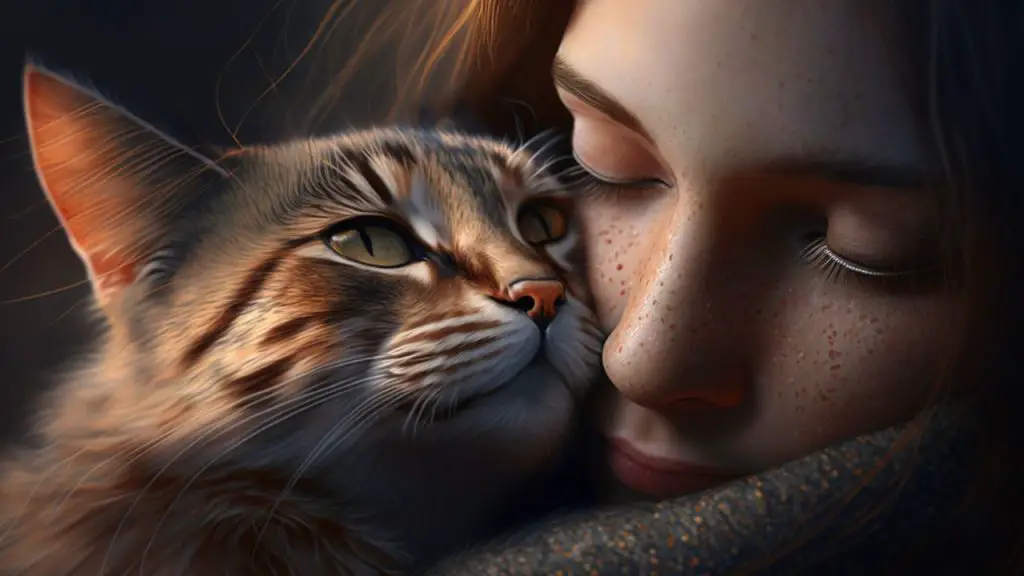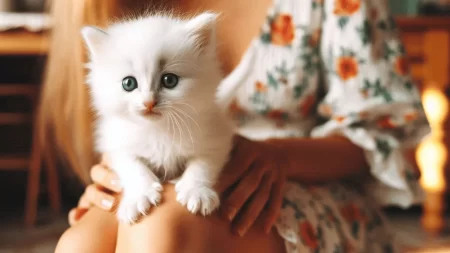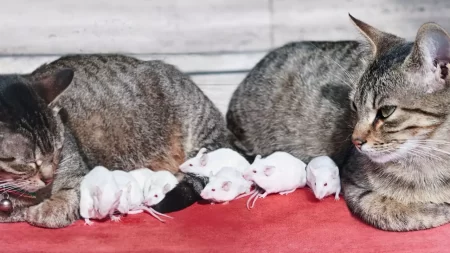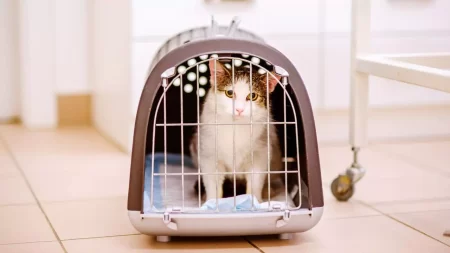Some people call it a “love bite”, while others call it “petting aggression”. This could be because your cat is too excited or just being playful. It’s important to read your cat’s body language to avoid getting bitten.
Yes, it’s normal behavior. Cats display affection by rubbing their scent on people and objects. They might also nip as a playful gesture or to communicate they’re overstimulated. Provide your cat with toys and a designated scratching post to redirect their behavior.
Understanding Cat Behavior
First, let’s explore how cats communicate. They use different methods like body language, sounds, and smells to express themselves. When a cat nuzzles you, they’re leaving their scent as a territorial marker. This may indicate they like you or desire attention. But if a cat bites you following a nuzzle, there could be multiple explanations.
What Are the Reasons Behind a Cat’s Nuzzling Behavior Followed by Biting?
Cats nuzzle for a variety of reasons, including:
Affection
Cats often nuzzle as a sign of affection and trust toward their owners. This behavior displays their sense of security and eases their presence. Nuzzling is a physical expression of their emotional connection and shows that they find comfort in being near you.
Marking Territory
Cats employ their scent glands located on their cheeks and around their ears to indicate their turf. This is done by rubbing their face on objects, including humans, leaving behind their distinct scent.
Seeking Attention
Cats are social animals and often seek attention from their owners. Nuzzling is a way of seeking attention and getting their owners to interact with them.
Why Do Cats Bite?
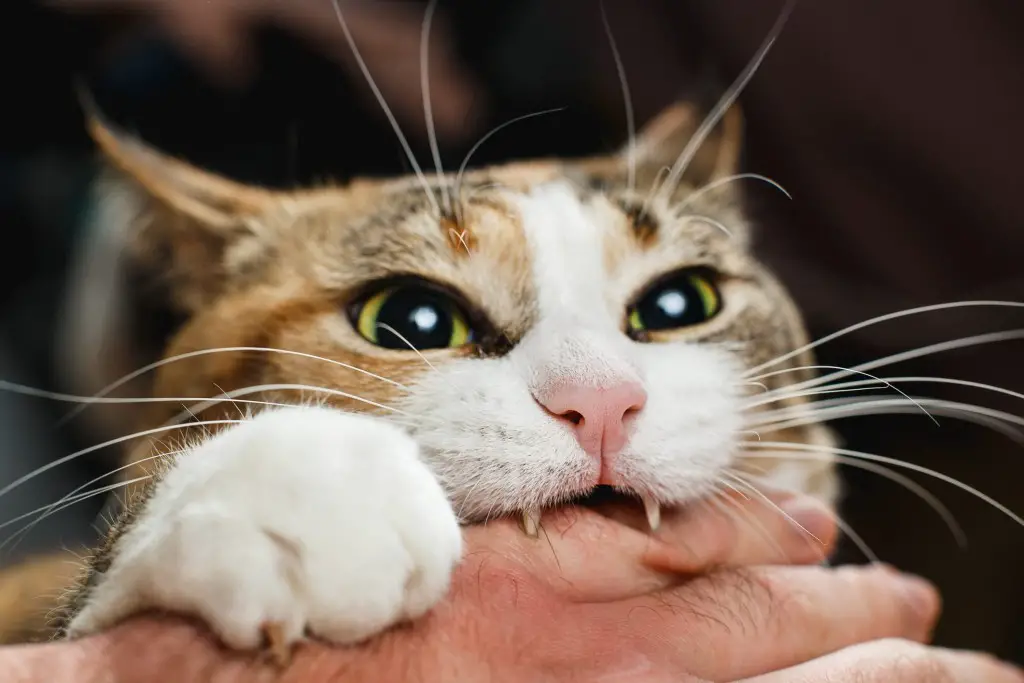
Cats bite for a variety of reasons, including:
Playful Behavior
Cats are natural predators and love to play. Biting can be a form of playful behavior, especially if the cat is still a kitten.
Overstimulation
Cats can become overstimulated if they are being petted for too long or too aggressively. Biting is a way of communicating to their owners to stop what they are doing.
Aggressive Behavior
Cats can also bite when they feel threatened or scared. Aggressive biting behavior is usually accompanied by other signs such as hissing, growling, or arching their backs.
How to Stop Your Cat From Biting?
To prevent your cat from biting, there are several effective solutions you can implement:
- Engage your feline companion in playtime by utilizing toys that are specifically designed for interactive play, like wands or balls. Redirect their lively energy towards these toys for a fun and stimulating experience. For example, you could use a feather wand to encourage your cat to jump and pounce or toss a ball for them to chase and catch.
- Avoid petting your cat in sensitive areas such as the stomach or tail.
- Watch for signs of overstimulation and stop petting your cat before they become agitated.
- Provide your cat with a scratching post and other appropriate outlets for its natural behaviors.
- Consider seeking professional help from a veterinarian or animal behaviorist if the behavior persists.
Is There a Way to Differentiate Between Affectionate Nuzzling and Aggressive Biting?
Yes, there are some signs you can look for to distinguish between affectionate nuzzling and aggressive biting in cats. Affectionate nuzzling is often accompanied by purring and relaxed body language, while aggressive biting may be accompanied by hissing, growling, or stiff body language. It’s important to pay attention to your cat’s body language and vocalizations to understand the motivations behind their behavior.
Are Certain Breeds More Prone to Nuzzling and Biting Than Others?
There is no specific breed of cat that is more prone to nuzzling and biting behavior than others. However, individual cats may exhibit different levels of affection or aggression, regardless of their breed. It’s important to understand your cat’s behavior and provide appropriate outlets for their natural behaviors, regardless of their breed.
How Can Understanding a Cat’s Body Language Help Identify the Motivations Behind Its Nuzzling and Biting Behavior?
Understanding a cat’s body language is crucial in identifying the motivations behind its nuzzling and biting behavior. For example, a relaxed and purring cat is likely showing affection, while a stiff and hissing cat may be exhibiting aggressive behavior. Paying attention to your cat’s body language and vocalizations can help you understand their needs and feelings, and provide appropriate responses to their behavior.
When to Seek Professional Help?
Sometimes, when cats bite, it could indicate an underlying health or behavioral issue. If your feline friend displays aggressive biting or appears fearful and anxious, seeking expert assistance is crucial. A vet or animal behaviorist can conduct an assessment and suggest a course of action to tackle the problem.
Conclusion
Cats nuzzle and bite for various reasons, including affection, marking territory, seeking attention, and playfulness. It’s important to understand your cat’s behavior and provide appropriate outlets for their natural behaviors. If your cat has a biting problem, take steps to redirect their behavior and seek professional help if necessary.
FAQs
Is it normal for cats to nuzzle and bite?
Yes, cats nuzzle and bite for various reasons, including affection, playfulness, and territorial behavior.
Why does my cat only bite me and not other people?
Your cat may be biting you because they feel more comfortable around you and see you as a safe target for their biting behavior.
Can cats be trained not to bite?
Yes, cats can be trained not to bite through positive reinforcement techniques and appropriate playtime activities.
Should I punish my cat for biting?
No, punishment is not an effective way to stop biting behavior in cats and can lead to increased aggression.
Is biting behavior in cats a sign of a medical issue?
In some cases, biting behavior in cats can be a sign of underlying health or behavioral issues. If your cat is exhibiting aggressive biting behavior or shows signs of fear or anxiety, it’s important to seek professional help.




